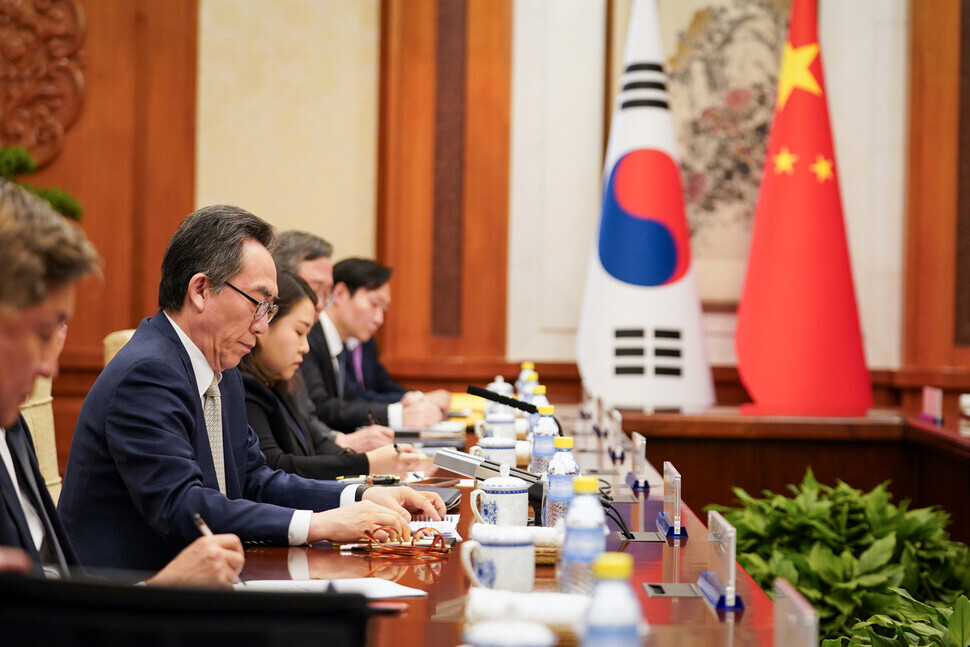hankyoreh
Links to other country sites 다른 나라 사이트 링크
[Editorial] Intensifying US-China rivalry means Seoul must address uncertainty with Beijing sooner than later

The US government has decided to raise its tariff rate for Chinese-made electric vehicles from 25% to 100%. Tariffs on semiconductors will also increase from 25% to 50%, and batteries and related components, natural graphite, and permanent magnets will also see significant increases or new tariffs. This follows an increase of tariffs on steel and aluminum to 25% last month. China has vowed to vehemently fight back. It’s unclear at this point whether China’s retaliations — and any further actions by the US — will trigger a chain reaction in global trade, but what is clear is that this poses a huge risk for South Korea’s highly trade-dependent economy.
US President Joe Biden imposed the tariffs under Section 301 of the Trade Act. After being briefly utilized by the Clinton administration in March 1994, the Trade Act was revived by former President Donald Trump in 2018 and used as a basis for tariffs on Chinese goods.
What many have heralded as the end of free trade, a notion that has been suggested since the rise of US-China hegemonic rivalry, is increasingly becoming a tangible reality thanks to the actions of the Biden administration.
US Trade Representative Katherine Tai said that the administration would impose additional sanctions if China moves its manufacturing to Mexico. China’s overcapacity has also been criticized by the European Union. If China tries to target the European market more aggressively in response to the US tariffs, Europe will likely follow the US’ suit and press forward with more of its own trade sanctions.
Of course, there are hopes that South Korean companies will benefit from US sanctions put in place to prevent Chinese goods from entering the US market. However, we should refrain from such shortsighted focus on immediate profits and losses. While the US is taking these measures to prevent China’s ascent in industries of the future, such as the semiconductor and electric vehicle industries, South Korea will not be immune from the changes resulting from the shift in trade orders. While we should adapt to unavoidable shifts, we should also be prudent and retain the rules we wish to preserve.
Even as the US-China hegemonic rivalry is brought closer and closer to the surface, China is still South Korea’s largest export partner — even if the scale of trade between the two isn’t what it used to be. It is also the source of many of our essential raw materials.
As the US-China conflict increasingly disrupts global supply chains, a stable trade relationship between South Korea and China is increasingly important for both countries. In the upcoming weeks, a South Korea-China-Japan summit will be held in South Korea, for the first time since talks were put on hiatus after December 2019. This summit should serve as an opportunity to resolve uncertainties in the South Korea-China relationship, as all three countries strive to prioritize everyone’s interests, as well as their own.
Please direct questions or comments to [english@hani.co.kr]

Editorial・opinion
![[Column] Kim and Putin’s new world order [Column] Kim and Putin’s new world order](https://flexible.img.hani.co.kr/flexible/normal/500/300/imgdb/original/2024/0625/9617193034806503.jpg) [Column] Kim and Putin’s new world order
[Column] Kim and Putin’s new world order![[Editorial] Workplace hazards can be prevented — why weren’t they this time? [Editorial] Workplace hazards can be prevented — why weren’t they this time?](https://flexible.img.hani.co.kr/flexible/normal/500/300/imgdb/original/2024/0625/7817193028141614.jpg) [Editorial] Workplace hazards can be prevented — why weren’t they this time?
[Editorial] Workplace hazards can be prevented — why weren’t they this time?- [Editorial] Seoul failed to use diplomacy with Moscow — now it’s resorting to threats
- [Column] Balloons, drones, wiretapping… Yongsan’s got it all!
- [Editorial] It’s time for us all to rethink our approach to North Korea
- [Column] Why empty gestures matter more than ever
- [Editorial] Seoul’s part in N. Korea, Russia upgrading ties to a ‘strategic partnership’
- [Column] The tragedy of Korea’s perpetually self-sabotaging diplomacy with Japan
- [Column] Moon Jae-in’s defense doublethink
- [Column] S. Korea-China cooperation still has a long way to go
Most viewed articles
- 1Foreign day laborers make up majority of death toll in Korean battery factory fire
- 2Blaze at lithium battery plant in Korea leaves over 20 dead
- 3[Column] Kim and Putin’s new world order
- 4[Editorial] Workplace hazards can be prevented — why weren’t they this time?
- 5[Editorial] Seoul failed to use diplomacy with Moscow — now it’s resorting to threats
- 6How sanctions are backfiring to fuel a new Eurasian alliance
- 7After Putin’s Pyongyang summit, Seoul and Moscow play dangerous game
- 8What made Korea’s lithium battery plant fire so deadly
- 9Enough trash-slinging — it’s time to pursue ‘strategic communication’
- 10The greatest Korean film of all time, as selected by local industry experts